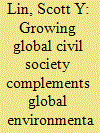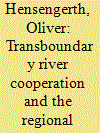| Srl | Item |
| 1 |
ID:
053119


|
|
|
|
|
| Publication |
Apr-Jun 1997.
|
|
|
|
|
|
|
|
|
|
|
|
|
|
|
|
| 2 |
ID:
126133


|
|
|
|
|
| Publication |
2013.
|
| Summary/Abstract |
Although the increasing influence of global civil society has been noted in environmental politics and this phenomenon is synonymous with global environmental governance, some questions remain: where does this change in mentality originate and through what forces, how are these forces motivated, and how do they continue to motivate the "environmental agenda"? A primary factor is the establishment of transnational institutions that stimulates the participation of global civil society in global environmental governance and how this participation has diminished government authority by reinforcing local loyalties with their viewpoints concerning the environment. Thus, the debate becomes how the interpretation of global environmental governance and "top-down" approaches affects and is affected by local practices in civil society. This study examines the growing importance of global civil society to the Lancang/Mekong fish catch- the world's largest inland fishery-and the dam project disputes concerning the Lancang/Mekong River. The following analysis concerns the influence of the rising global civil society on the effectiveness of these environmental governance entities. The analysis indicates that participation of the global civil society in the Lancang/Mekong dam decision-making process concerning the fisheries does not replace the traditional mechanism of governmental governance. Instead, the growing influence of the global civil society is compatible with operations of the governmental governance mechanism, complementing the function of global environmental governance.
|
|
|
|
|
|
|
|
|
|
|
|
|
|
|
|
| 3 |
ID:
089917


|
|
|
|
|
| Publication |
2009.
|
| Summary/Abstract |
The article compares three cooperation projects in the Mekong River basin: the Greater Mekong Subregion, the Quadripartite Economic Cooperation initiative and the Mekong River Commission. It analyses the three projects by asking if and how they produce a regional public good. Part of the public good discussion is participatory governance, which, in natural resource management, has become a prominent proposal for enhancing the efficiency of resource management by involving all relevant stakeholders. The central question is whether participatory governance leads to the avoidance of conflict, better resource management, and thus the creation or maintenance of a regional public good. The article will address the relevance of these concepts for watershed management of the Mekong River.
|
|
|
|
|
|
|
|
|
|
|
|
|
|
|
|